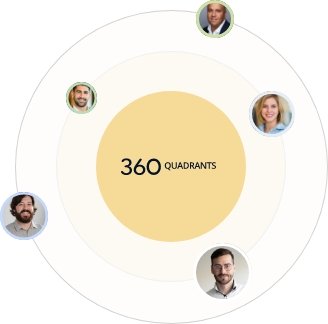Spectroscopy is the use of the absorption, emission, or scattering of electromagnetic radiation by atomic or molecular ions to qualitatively or quantitatively study atoms or molecules, or to study the physical processes. Spectroscopy technologies include molecular spectroscopy, mass spectroscopy, and atomic spectroscopy. Molecular spectroscopy is an analytical technique that measures the spectrum response of the molecules interacting with various frequencies and energy.
The competitive landscape provides information on the major players offering products and solutions in the molecular spectroscopy market and outlines the findings and analysis on how well each vendor performs within our criteria. The vendor evaluations are based on two broad categories—Strength of Product Portfolio and Business Strategy Excellence. Each category carries various criteria, based on which the vendors have been evaluated. The evaluation criteria considered under Strength of Product Portfolio includes the breadth of offering, delivery, post-sales support services, and market experience. The evaluation criteria considered under the Business Strategy Excellence includes the companies’ reach (on the basis of market and their geographic presence), organic growth (includes new product launches), and inorganic growth (on the basis of partnerships, collaborations, mergers, acquisitions, and expansions).
Vendors who come under this category receive high scores for most evaluation criteria. They have an established product portfolio and a very strong market presence. They provide mature and reputable products and services. They also have strong business strategies.
Vendors who come under this category have niche product offerings and have started to gain a position in the market. They do not have strong business strategies as compared to other established vendors. They might be new entrants in the market and may require some time before gaining significant traction in the market.
Vendors who come under this category have demonstrated substantial product innovations as compared to their competitors. They have innovative products and the potential to develop strong strategies to bring their business growth at par with the Visionary Leaders.
Vendors who come under this category are established with a very strong business strategy, but have weaker product offerings as compared to other vendors. The molecular spectroscopy market, by application, is segmented into pharmaceutical applications, biotechnology & biopharmaceutical applications, environmental testing, food & beverage testing, academic research, and other applications, such as chemicals, polymers/materials. The pharmaceutical industry forms the largest application segment of molecular spectroscopy. Molecular spectroscopy techniques, such as IR, NMR and Raman spectroscopy are used in various stages of the drug development process. The quality assurance process for food & beverage consumed by humans is very important. Several molecular spectroscopy techniques are applied to deliver high-quality food & beverage in the market. Fourier-transform NIR is an ideal technology for food & beverage analysis. It has applications in liquid & dairy, baking, meat, and seafood industries. With the help of NIR, liquids such as alcoholic beverages, liquid sweeteners, edible oils, fruit juices, coffee, and tea can be rapidly analyzed for moisture, protein, fat, free fatty acids, ethanol, and carbohydrates. Dairy products, such as milk, cheese, yogurt, baby formulas, dried milk, and powders can be measured for fat, moisture, protein, and lactose. Bakery products, such as bread and biscuits can also be tested for proteins, moisture, oil, ash, starch damage, and water adsorption. With the development of technologically-advanced molecular spectroscopy systems, such as highthroughput instruments, micro-volume sampling instruments, miniaturization of instruments, and automation in sampling, the applications of molecular spectroscopy in the biotechnology industry is increasing.



